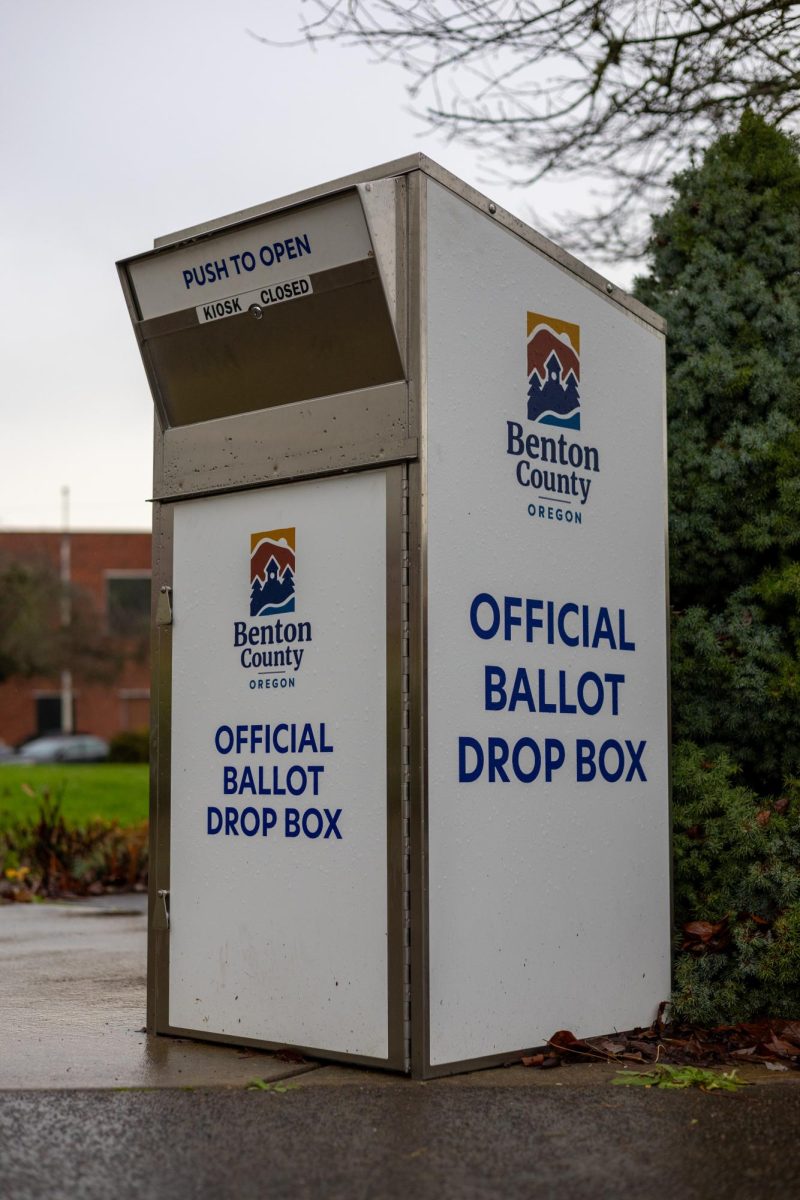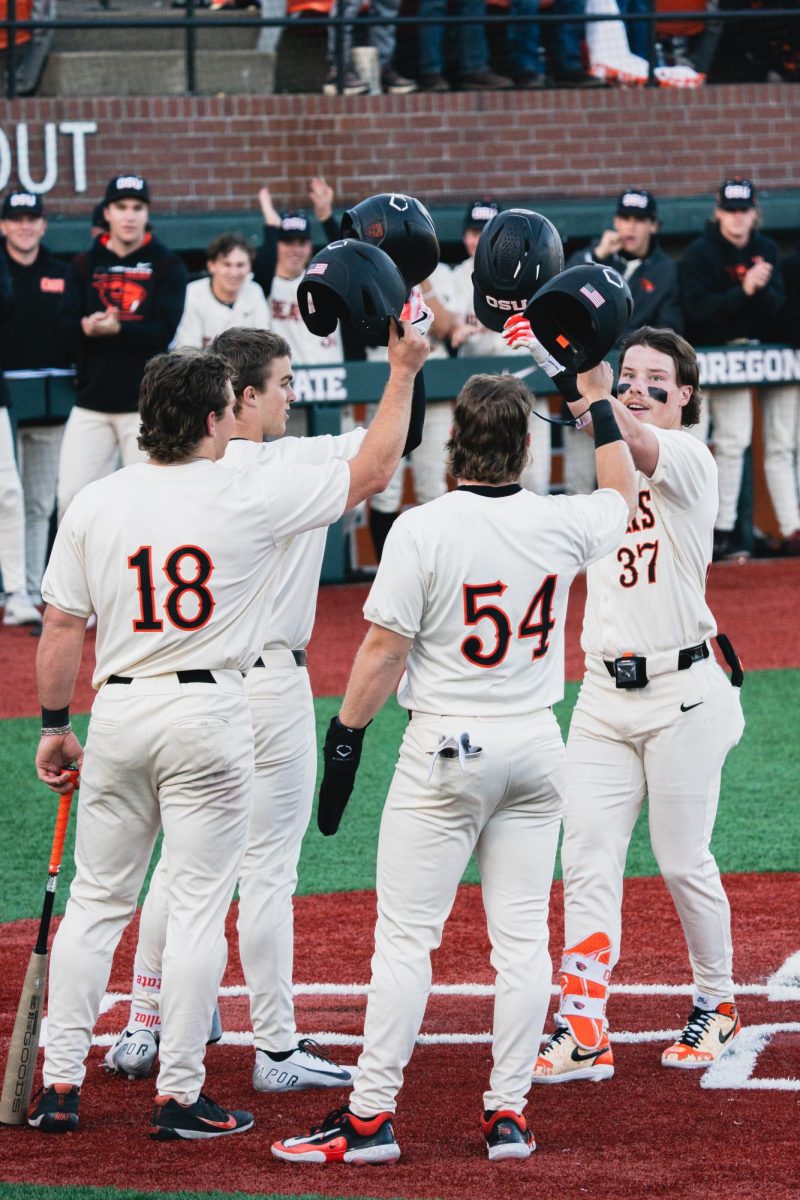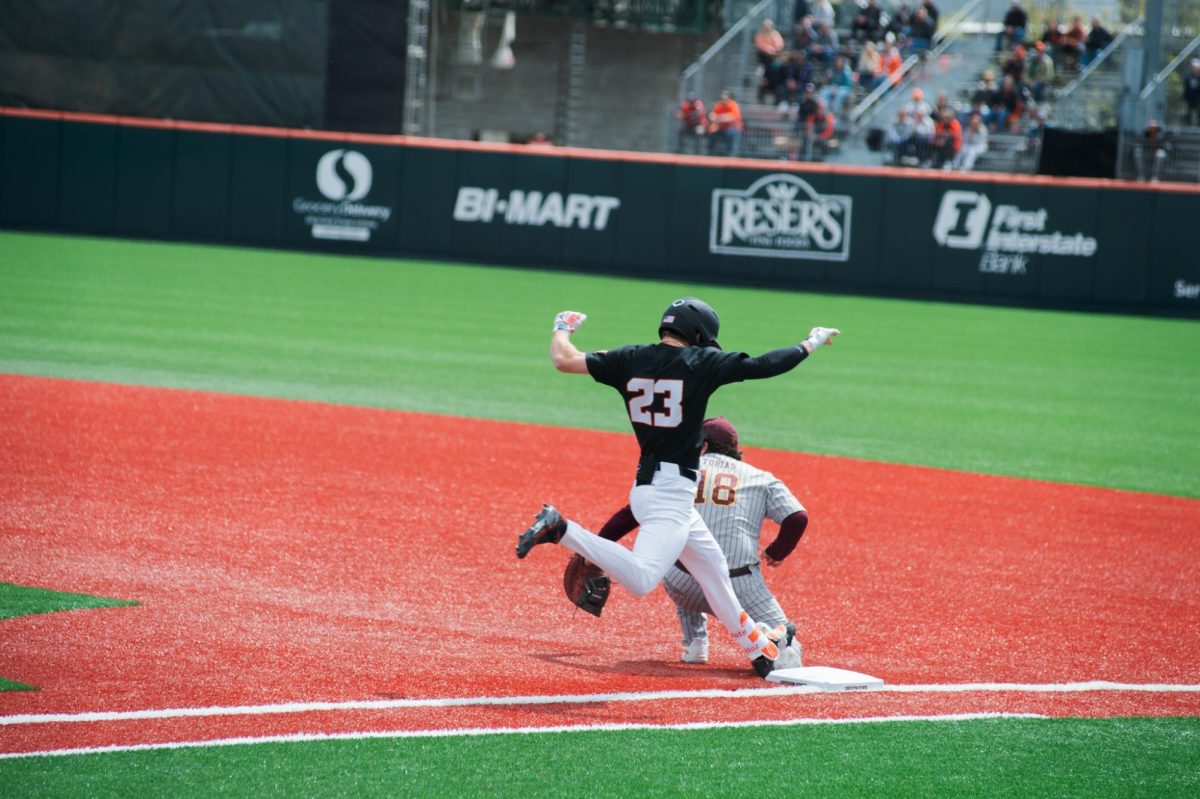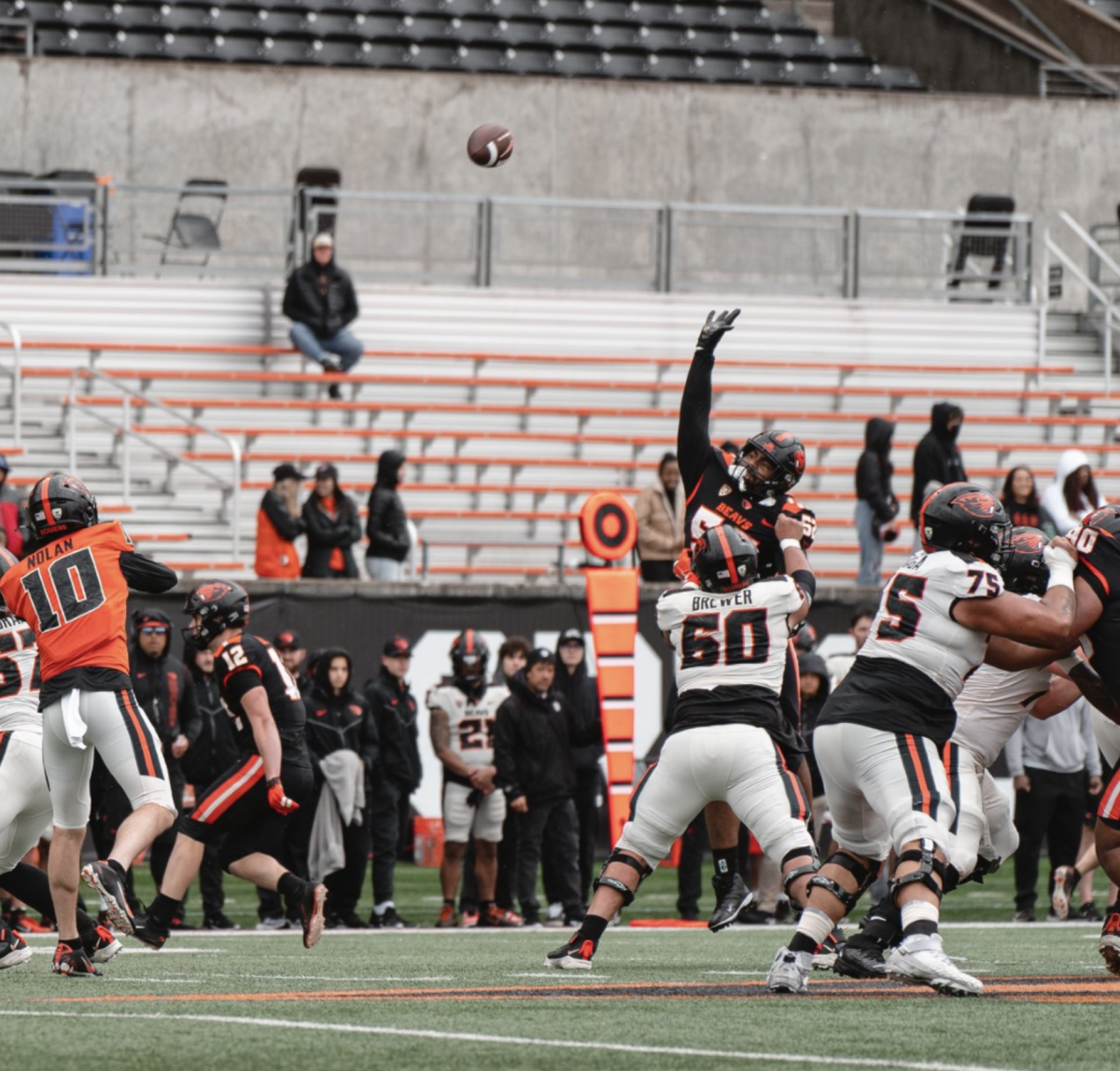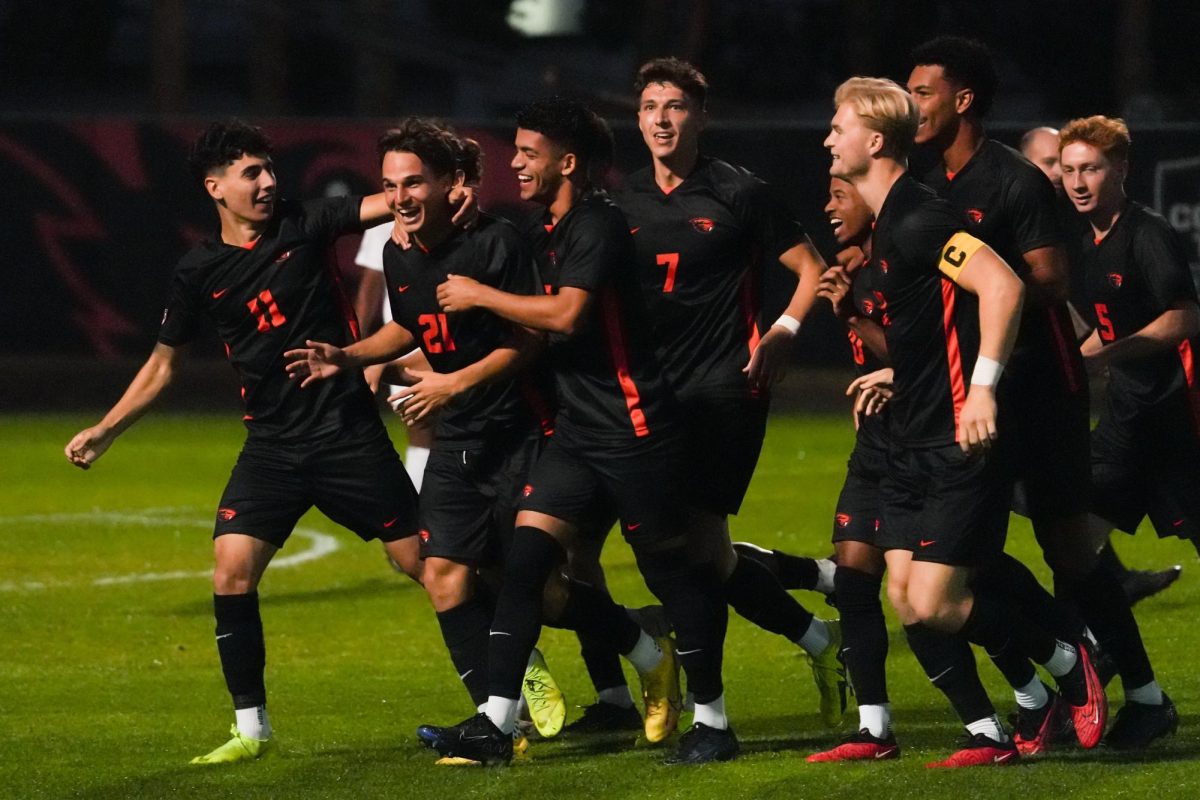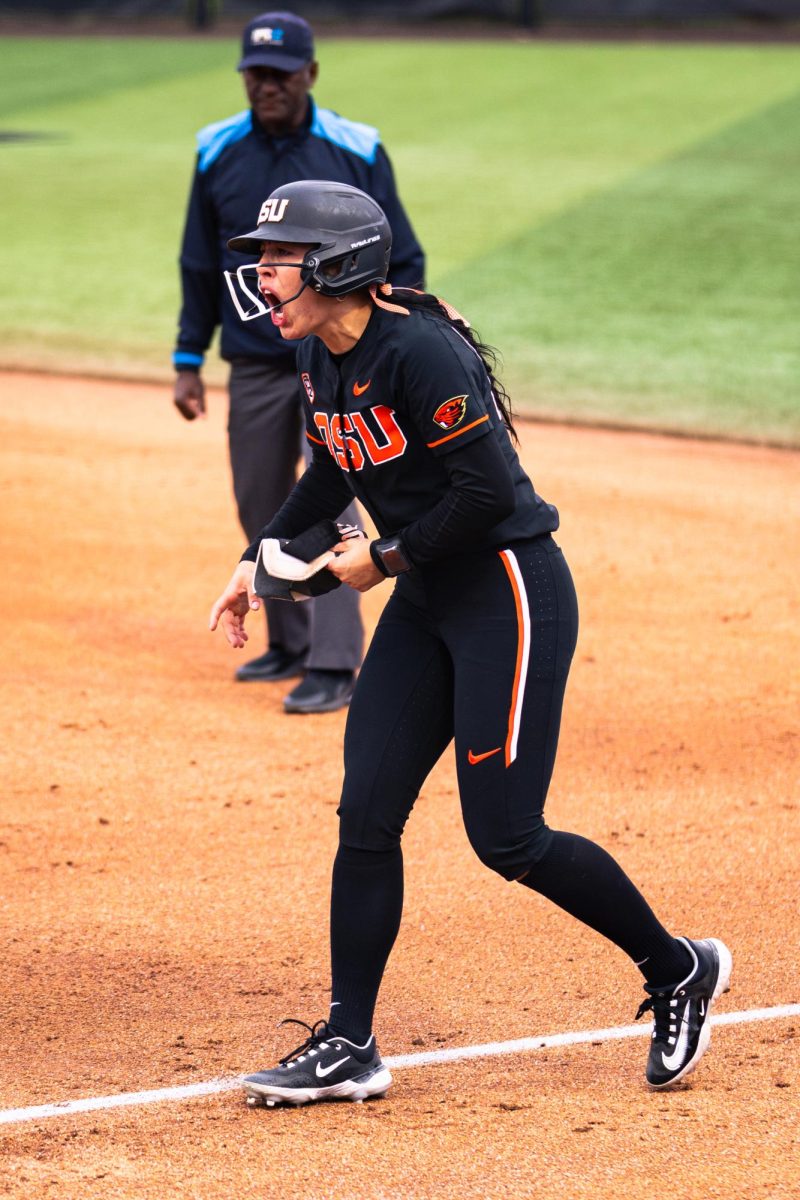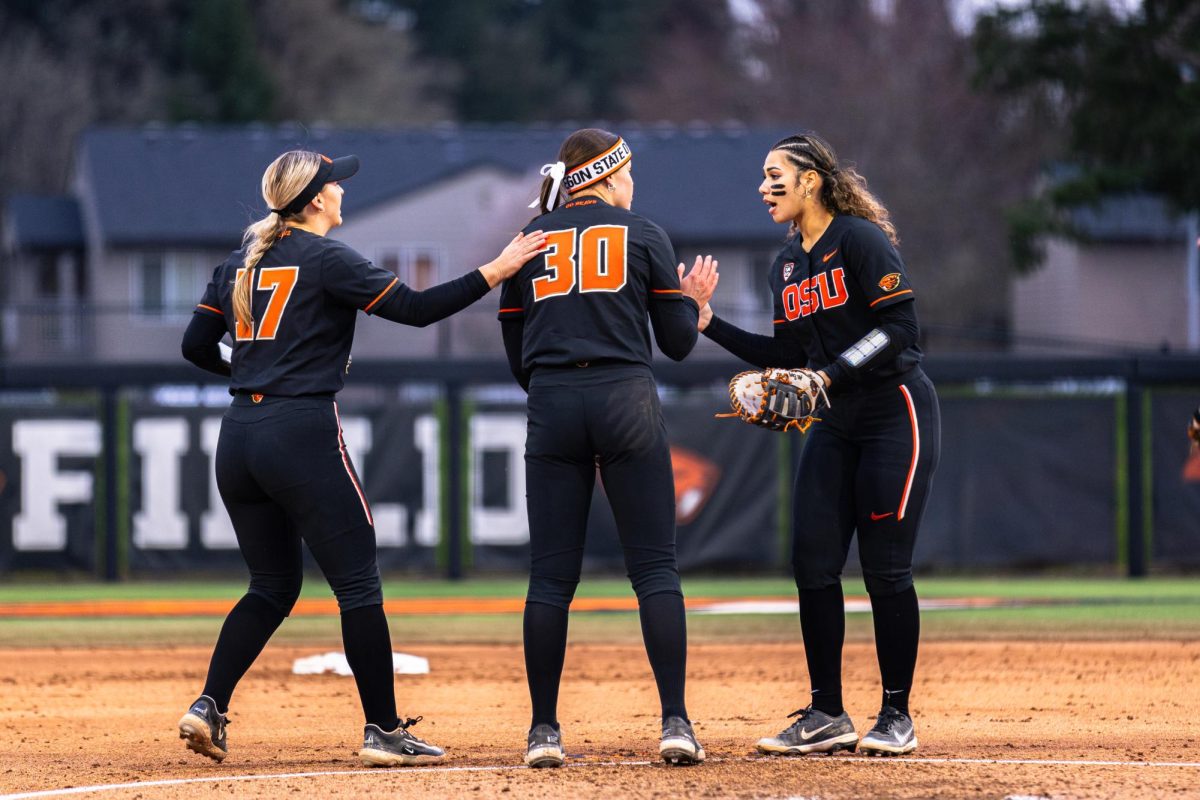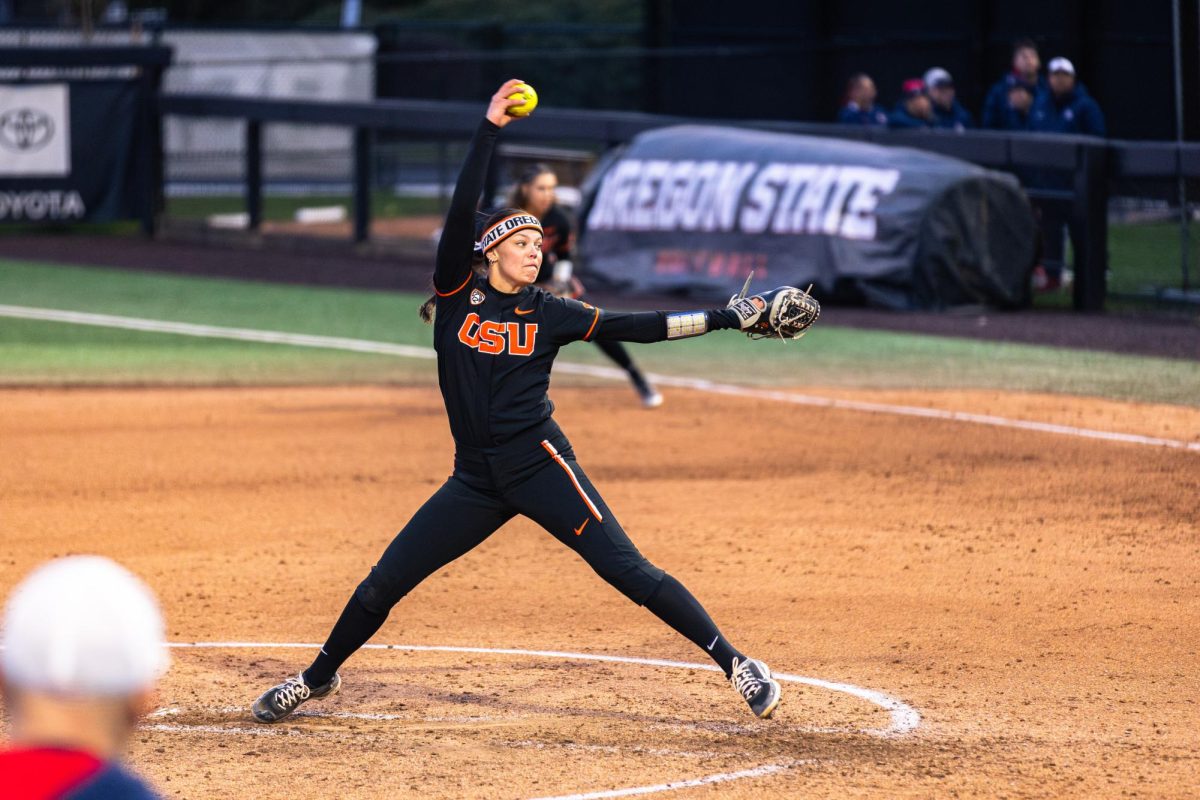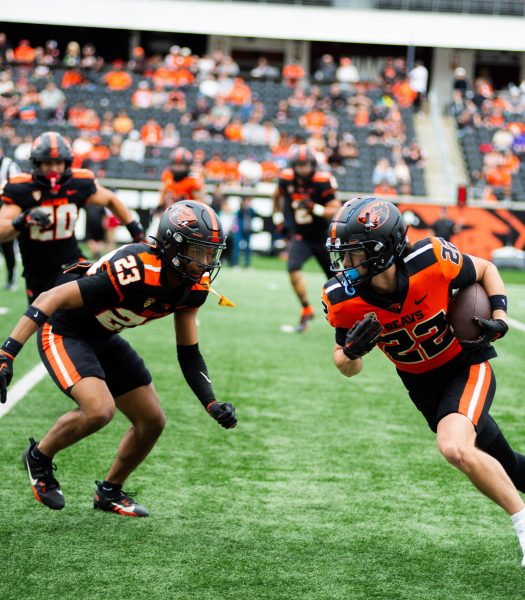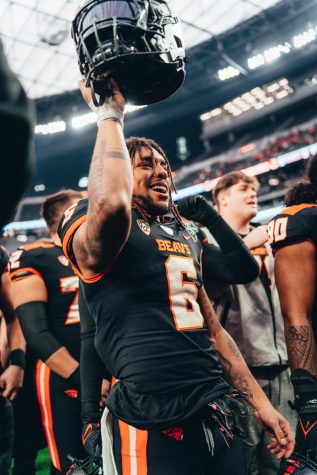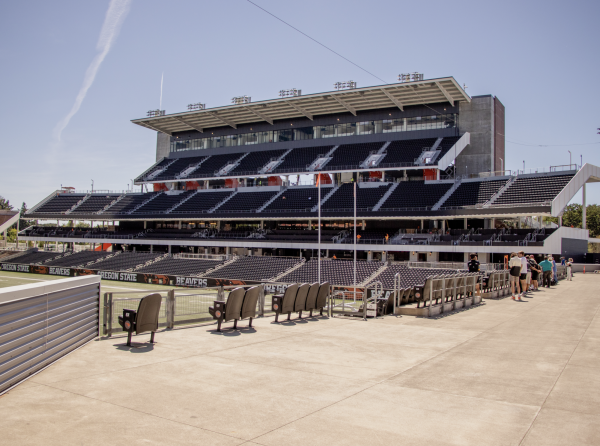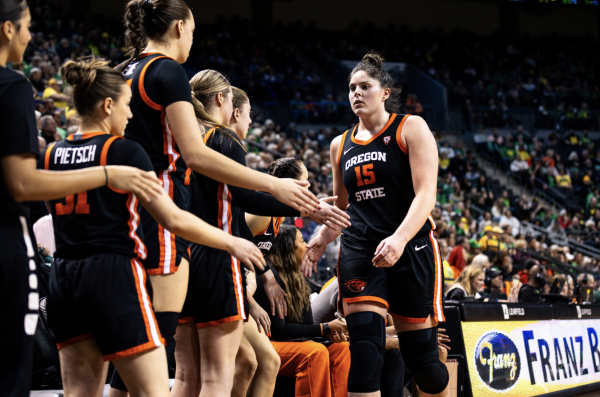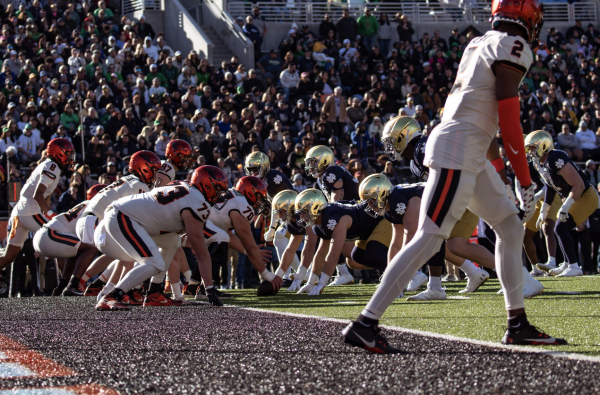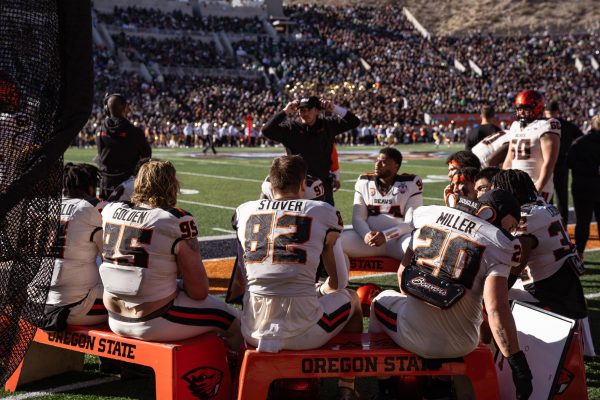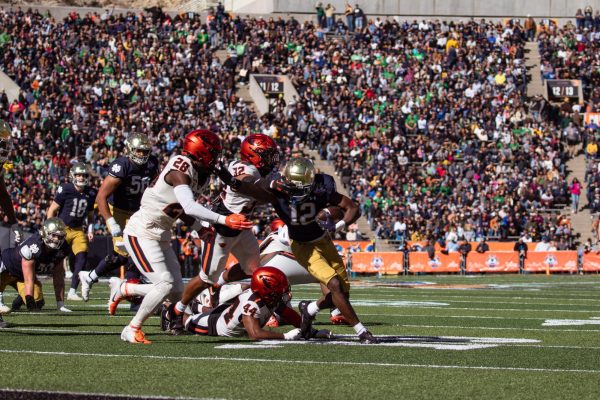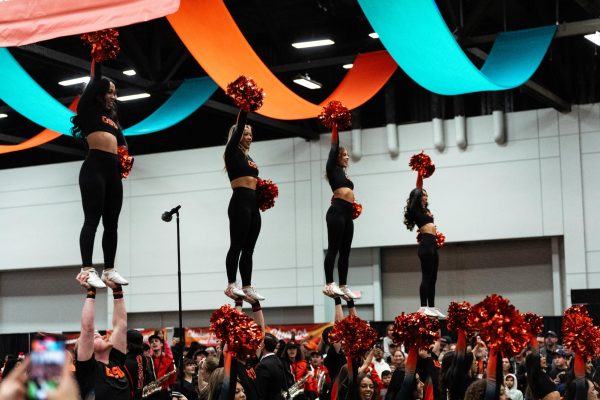A process of maturity
May 24, 2016
Former OSU football player Mishawn Cummings lives a different lifestyle compared to his time in Corvallis
Mishawn Cummings knew he had football practice at 6 a.m. the next morning.
Cummings was a sophomore cornerback on the Oregon State football team in 2011, spending the year redshirting after transferring for the second time. As it turned out, OSU would become the middle of five different schools Cummings attended.
One fall evening in the middle of the Beavers’ 2011 season, Cummings decided to hit the party scene instead of resting before the early practice session. He didn’t return to his room in Finley Hall until a couple hours before practice was scheduled to start.
“I was chilling with a girl and I went to bed at like 3 or 4 a.m.,” Cummings said. “I turned my alarm off and I remember her waking me up like, ‘You have to go to practice.’ I’m looking at the time like, ‘Gosh, practice is about to be over.’”
A frantic Cummings decided to sprint to Reser Stadium, where he received a verbal lashing from defensive backs coach Keith Heyward. Heyward made him do wind sprints on his own while his teammates practiced.
“I just remember running most of that practice,” Cummings said. “I didn’t get to do anything. After I got done running, then he threw me in practice and I was beat tired, so that was a real struggle trying to guard people and do special teams stuff with no legs. That was a major, major eye opener for me that day.”
Cummings would like to say that one incident was a small blip on the radar; one mistake lost among an otherwise solid career playing football for OSU. Cummings, however, spent more of his two years in Corvallis on Frat Row than he did on the playing field. He was suspended three separate times and eventually transferred to Portland State. His career stat line with the Beavers: no interceptions, no sacks, no games started and one tackle.
“I partied my butt off,” Cummings said. “I kind’ve neglected the football side. Football-wise was overall a fifty-fifty experience. I had my good days and I had a lot of bad times there. Most of it I inflicted on myself.”
Cummings’ athleticism was never the issue. The 5-foot-10, 194-pounder had decent size and good speed, but OSU’s coaches wouldn’t play him because of his off-field issues and work ethic. Cummings took it personally and especially developed a grudge towards the coaching staff because they wouldn’t let him change positions from cornerback to his preferred position of free safety. The coaches were more concerned about where his mind was at, than what position he played.
“I’m still hearing stories about you walking into the weight room hung over,” head coach Mike Riley told Cummings at the time.
Cummings also remembers his behavior affecting his teammates — after missing too many weight lifting sessions, the coaching staff’s punishment was to make every cornerback meet at the weight room at 5 a.m. on a weekday to watch Cummings pay his dues through calisthenics. Teammates like Jordan Poyer, Brandin Cooks and Storm Woods tried to support and encourage him, but Cummings wasn’t ready or willing to change his conduct and he continued to clash with his coaches.
“Jordan Poyer and all them came at me respectfully. They were like, ‘Bro, we’re pulling for you, we want you to do right.’ They could have been a-holes and jerks about it,” Cummings said. “There was one or two times where I walked off the field like, ‘man, I can’t do this.’ Coach Riley would lay into me, but now that I look back, that’s part of coaching.”
Cummings isn’t secretive anymore about his struggles in Corvallis. He knows how much of an opportunity he had: of the five schools he played football for, OSU was the only Division-I program. He spent one year at City College of San Francisco after losing a recruiting interest in high school due to a broken leg. He went to Foothill Junior College in 2010, made the leap to the Pac-12 in 2011, ended up at Portland State, got kicked off the team there and finished at Concord University in West Virginia.
Part of the issue, Cummings says, was how he handled his relationship with his father.
Michael Cummings left the family when Mishawn was 11 years old. They kept in contact and Michael even coached Mishawn’s football teams, but there was plenty of enmity between the two as time went on.
“I never really understood truly why my dad left at the time,” Mishawn said. “It bothered me a lot. I became hateful towards my dad.”
Michael was always Mishawn’s harshest critic. Sometimes too harsh, they now both agree.
“He told me a few things I didn’t like when I was about to transfer [to OSU] that I was going to screw up, that I’m not going to go anywhere, and wherever I do go I’m going to [expletive] it up,” Mishawn said. “That bothers me to this day. I tried to prove him wrong at Oregon State. There, I was just trying to have fun because of the stress I went through.”
“I was like, ‘He doesn’t know what he’s talking about. I’m a man. I’m about to have fun.’ Then I fell into that life with the drinking and all that, trying to be free and happy now that I made it.”
Childhood friend Cameron Marshall saw the whole act unfold, from Cummings’ middle school days when he practically lived at Marshall’s house to his time in college trying to prove it was he, and not his father, in charge of his own life.
“He got a little comfortable and entitled,” Marshall said, who was playing running back for Arizona State while Cummings was at OSU. “And that’s not the type of person he is. He’s a hard worker, he’s a competitive guy. He’s a good guy. Maybe in those environments, he got a little complacent.”
Even when the elder Cummings came to visit Corvallis, Mishawn was not particularly receptive to his father’s direction.
“He held that part to himself,” Michael said. “I traveled up there quite often while he was there [at OSU] but at the same time, he’s got to be willing to make those decisions and changes.”
Cummings’ issues at OSU finally boiled over during one practice. Academic progress reports had recently been updated and Cummings posted poor grades. He noticed coaches purposefully giving other players more repetitions than normal, and Cummings finally had enough. He walked into coach Riley’s office, told him his decision to quit and wouldn’t be swayed by any advice from Riley or his teammates.
“Looking back on it, I’m a completely different person,” Cummings said. “My stomach cringes thinking about it. Like, ‘Who were you? How is that possible?’”
The Transition
There was no epiphany for Cummings after he left OSU. There wasn’t a single point in time where he suddenly matured, stopped partying and cleaned up his act. But Cummings will be the first to say that he is not the same person he was in Corvallis.
After playing one year for PSU, Cummings had his most successful collegiate season at Concord University, where he earned All-Mountain East Conference honors in 2014. He barely drank at Concord and his leg injury bothered him less than it ever had before. He was able to switch to free safety like he wanted, the coaches allowed him to call defensive plays and Cummings took pride in respecting the staff and showing up to practices on time. In Concord’s first ever playoff victory in 2014, Cummings made a key interception.
“I got the interception, and everybody was going wild. That was a great capstone in my career, Cummings said. “That season was what I thought and dreamed Oregon State would be.”
“When [OSU and PSU] didn’t work out for him, he realized how hard he actually had to work to be successful and do what he wanted to do,” Marshall added. “And he did that.”
Today, Cummings has been sober for about 18 months. He had been sober for about a year when he went out for a drink on New Year’s Eve, when the first drop of alcohol brought back the memories of his parties in Corvallis.
“I remember taking the first sip,” Cummings said. “How did I drink like that [at OSU]? Not even drink but get wasted and keep doing it Monday through Sunday while I’m trying to play? I’m a totally different person.”
Cummings points to four factors that played into his substantial personality shift.
The first was reading his Bible. Cummings doesn’t like to think of reading his Bible as a ritual or a vain habit, but he reads it every morning and night and oftentimes in the middle of the day as well.
“I’m reading the Bible and trying to live a certain life. I’m like, ‘If I’m trying to be this person and live this life and be one with God, I have to change,’” Cummings said. “That was a major change, I would say about 65 or 70 percent of it.”
The second factor was Brandin Cooks. The 2013 Biletnikoff Award winner was the best wide receiver in the nation, but Cooks did not consider himself above a teammate like Cummings. The pair lived together for about two years while playing for OSU.
“Even when he made it to the NFL, going in the first round [in the draft], he kept in touch with me almost every day,” Cummings said. “It helped me be better knowing he was sober, doesn’t drink, doesn’t smoke. Never did, either. He treated his body like a temple, and that helped me. I see a perfect example of it.”
”It made me say, ‘Okay, it may be too late for me sports-wise, but I can definitely be a better person.’”
The third factor was Marshall. Cummings and Marshall started playing football together in San Jose as 11-year-olds, and Marshall’s familiarity with Cummings’ background has helped him provide stability and encouragement.
“He was at my house pretty much every day,” Marshall said of their friendship in middle and high school. “I kind’ve heard from him that things weren’t always great at home. He knew that he could always come to my house.”
The fourth factor was Cummings’ mother, Sharon. Cummings has always been very protective of his mother — “like a pit bull,” Cummings says — particularly after his parents separated. Sharon always gave good advice to Mishawn, which he acknowledges he often used to ignore.
“She would always tell me the right things and I would do what I want,” Cummings said.
But that, after all, is Cummings’ story: he used to let down the people who supported him the most. Now, he’s on good terms even with the people he fought with the most. Most significantly, his father.
Both have gone through an intense growth over the years, becoming sober and creating smoother relationships with family. What once was a broken father-son relationship, Mishawn now calls “peachy.”
“Now, I look at him like an older brother,” Mishawn said. “It seems like we’re roommates now. I can’t remember the last time we got in a fight or argument about anything. It comes back to maturity, but also knowing our past and respect for each other. If there is a time to get mad, we just don’t do it because we know what we’ve been through.”
“The maturity level now — it’s just a huge difference,” Michael added. “There’s no drinking and he’s definitely a much more mature young man than he was four years ago.”
More ahead
Mishawn still hasn’t given up on the football dream; he has a contract to play in the National Gridiron League in Australia this fall. In the meantime, he’s kept himself plenty busy with a variety of other endeavors.
After his senior year at Concord, he moved back to San Jose and started doing personal training at a gym. He’s also dabbled in dog breeding, hair cutting and fixing up old cars to sell for a profit. He used to unsuccessfully multitask between partying and football in Corvallis. Now, he successfully multitasks between several jobs in San Jose. Even when it’s not football, something like fixing up cars is perfect for his handiness.
“Mishawn is the type of person that can look at something a couple times and grasp it pretty quickly,” Marshall said. “I was always jealous of him for that. I used to always have him draw up my school projects back in the day.”
There’s one thing Marshall doesn’t think Cummings can succeed in: hair cutting.
“I would not let him cut my hair,” Marshall said with a laugh.
Other than opening a barbershop, Cummings seems to have plenty of potential opportunities in his future. In personal training, he’s got his football background and injury experience to draw from. In fixing cars, he can rely on his craftiness. And maybe most importantly, he’s sober and prioritizing his life drastically differently than when he was at OSU.
“For being young, all the greed and fuss, all the extra stuff — now that I’m getting older it doesn’t mean anything, because those things break and don’t go with you when you die,” Cummings said. “Reading the Bible, every story that I’ve read so far, there’s a strong man or woman who fell and lost whatever God gave them, whether it’s Samson or someone else. But then God gave them a second chance. Life was different when God gave them a second chance. So I’ve kinda had my arms open. Wherever God takes me, whether it’s back to football or in a different direction, it’s always me second and him first. And I’m even trying to put other people second and me third. If I can help another kid, another athlete, be where I was the correct way, if I can make somebody else feel better about their day and make them be successful, that’s what my end game is.”
Cummings, now 25 years old, used to be the type of player who would complain to coaches about not getting enough playing time. Now, he considers himself the type of man that wants to impact others with the gifts he’s been given.
“As soon as my alarm goes off and I wake up, I hit the ground running at 100 percent,” Cummings said. “I don’t do 50, I don’t do 80, I don’t even do 90 anymore, because I know where that stuff got me. So whatever I’m doing, I’m going to do 100 percent of it. When I’m personal training somebody, it’s 100 percent. When I’m training myself, it’s 100. If I’m working on a car, it’s 100 percent. As for my future, I don’t know. It’s still too foggy and cloudy right now. But we’re definitely going to find out soon, and I’m excited for it.”
On Twitter @BrightTies







